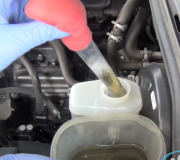I still don't know why bleeding was necessary, but regardless, pedal-bleeding requires two people, (or one person with really long arms)! Most importantly, the brake pedal must never be pushed more than halfway to the floor unless the master cylinder is less than about a year old. Crud and corrosion build up in the bottoms of the bores where the two pistons don't normally travel. Running the pedal all the way down, either from being surprised from a ruptured hose, or from an inexperienced mechanic, runs the pistons over that crud and rips the lip seals. It is possible for no damage to occur, but most often one seal is ripped resulting in a slowly-sinking brake pedal, often a couple of days later. It is also possible to rip both seals resulting in the inability to develop any fluid pressure. In this case, most of the time gravity-bleeding still works but you won't get a good pedal. The only fix for those conditions is to replace the master cylinder.
If the master cylinder was replaced, there is a simple trick to avoid having to bleed at the wheels or even remove them. If the replacement master cylinder wasn't bench-bled first, or an old one was allowed to run empty, there is going to be a lot of air in the system. One trick to help the process is to remove the front wheels, then use a flat-blade screwdriver to pry the pistons back into the calipers. Doing that will push brake fluid back up to the reservoir and wash any air bubbles in those two lines back up there with it. At that point the pedal has to be pumped again to work the pistons back out, so again, be sure to not push the pedal more than halfway to the floor.
If this pedal-bleeding was done by one person with a bleeder screw open, air will get sucked back in a lot faster than any fluid will be pushed out. By now the entire system is likely full of air. Gravity-bleeding is the only method I use and it avoids all these potential problems. Simply fill the reservoir, leave the cap slightly loose so no vacuum builds up inside it, and open all four bleeder screws. After a few minutes, one will have fluid dripping from it. Close that bleeder and wait for the next one. When all four bleeder screws are closed, "irritate" the brake pedal a couple of times by hand to wash any air bubbles into the wheel cylinders and calipers. Open each bleeder once more for a few seconds to let those bubbles out, and you're done.
Wednesday, April 29th, 2015 AT 9:43 PM



